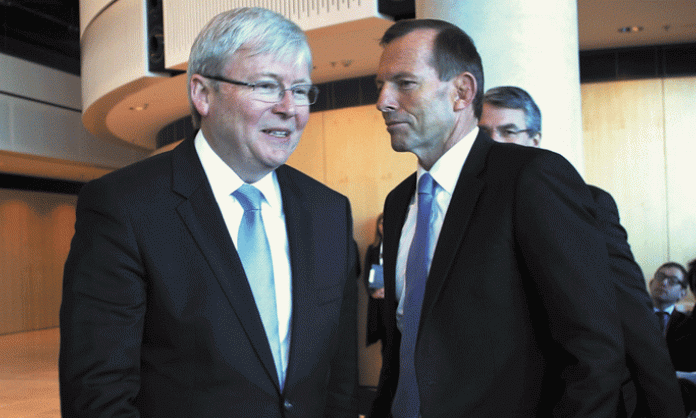There is one thing certain to come out of the 2013 federal election: the contest will be won by a right wing pro-big business party intent on attacking workers and the poor.
The backdrop to this year’s poll is the unwinding of the mining investment boom and the softening of the economic outlook. The May Budget outlined revenue write downs of $60 billion over 4 years. The 2 August mini budget added another $33 billion on top of those – and this might yet be optimistic.
Revenues have not grown at Treasury forecast rates – but they have nevertheless been growing. Will they continue to do so? A note from investment bank Morgan Stanley to investors on 5 August, if accurate, suggests not. The advice warned that the size of the investment drop-off in the mining industry has been underestimated:
“A severe and prolonged decline in Australian E&C [engineering and construction] activity appears to be the most likely outcome. Australian E&C activity has grown continuously for twelve years with activity in 2012 some 598 percent above that of 2001.
“The golden run is over – our forecasts now suggest we are entering a period of double digit declines in activity driven by declining E&C [expenditure], an event that is unprecedented in the 27 years of data we hold ... we think the real downturn is only now about to begin.”
Kevin Rudd wants to fight the election on the question of which party is most capable of “transitioning” to a new economic growth model. Yet a production gap is opening that no other industry seems capable of filling. That will open the possibility of recession.
A transition to where?
The period since the onset of the global financial crisis has seen new government spending initiatives – such as pension increases, secondary school funding increases, a nominal commitment to equal pay in the community sector – announced side by side with cutbacks in other areas.
Labor has been giving with one hand while taking with the other: single mothers losing parenting payments, tertiary education funding facing cuts of $2.3 billion, people being pushed off disability support pensions, several billion dollars stripped from the public service, a levy on bank savings that will be passed on to those with the least money etc.
We are now transitioning to a period where the cuts are going to come faster and go deeper; spending on services for those who really need them will be under the microscope while executive salaries will be left to increase unchecked.
The bosses have been increasingly vocal about their desire for an industrial relations system that gives them more power over workers and allows more “flexibility” to pay people less. They want a productivity revolution to increase what they squeeze out of workers.
Their backers in the media have bemoaned the “culture of entitlement” that grips the country. They’re not talking about CEOs and mining magnates who have seen their fortunes lifted astronomically over the course of the decade. They are talking about workers who think that the majority of the population deserves, in a country of such abundance, a decent working life and well funded social services.
Labor says that the great danger lies in the election of a Liberal Party beholden to big business. But both parties fall over themselves to please the Business Council and the super wealthy.
It is only a matter of degree when attempting to differentiate between the two. Both are for low corporate tax rates, both have bent to the wills of the giant banks and mining companies, both are committed to a neoliberal user-pays model of service provision that is increasingly privatised and both place the market above the environment.
In fact, Labor has attempted to outbid the Coalition as the most pro-business manager of Australian capitalism. Leading party figures attack the conservatives for being fiscally reckless – to the point where the Liberals’ paid maternity leave scheme is attacked for being “too generous” and an impost on business. Treasurer Chris Bowen boasts that the ALP is the party responsible for “financial deregulation [and] government enterprise privatisation”.
Rudd’s election announcement focused on plans for “a new national competitiveness agenda” to help lift the fortunes of Australian capitalists. He spoke in the language of partnership and “common interests”. But the wants of business are counterposed to the interests of workers and the poor. The only partnership business is interested in is one that neuters any opposition to its agenda.
When the PM asked, “Who do you trust?” he was speaking to that business community. He wants to reassure them that he can manage the transition to slower growth while maintaining their profits as high as possible.
How that happens is clear: by pushing the burden of any crisis onto workers and the poor. The Liberals and Labor are united in that project. In that regard, this election provides no real choice at all.








